Book contents
- Frontmatter
- Contents
- Foreword
- Notes on contributors
- Introduction: Scoping corporate elites and public education
- Part 1 Corporatised governance: system perspectives
- Part 2 Corporatised governance: provision perspectives
- Conclusion: The challenge of corporate elites and public education
- References
- Index
five - Corporate elites and higher education reform: the corporatisation of academic life in Indonesia
Published online by Cambridge University Press: 05 April 2022
- Frontmatter
- Contents
- Foreword
- Notes on contributors
- Introduction: Scoping corporate elites and public education
- Part 1 Corporatised governance: system perspectives
- Part 2 Corporatised governance: provision perspectives
- Conclusion: The challenge of corporate elites and public education
- References
- Index
Summary
Introduction
The past few decades have witnessed a rapid growth in the power and influence of corporate elites in higher education linked to a notion of education in general that foregrounds its economic importance (Giroux, 2003) and, as such, is intimately associated with a human capital theory of education. The influence of corporate elites and a concomitant heightened economic role for higher education is nowhere more apparent than in attempts made by affluent Western countries to transform the legal structures of world trade through the World Trade Organization (WTO) and its associated General Agreement on Trade in Services (GATS).
Under the WTO/GATS, higher education is constructed as a tradeable commodity on the global market, whereby member states take on obligations to reduce barriers to their higher educational services and policies (Robertson et al, 2002), opening up commercial markets for private sector investors and traders. This is viewed as being linked to the immediate interests of corporate elites including, in particular, wealthy investors and large corporations, who stand to benefit directly from a marked expansion of profit-making opportunities in higher education. Indeed, the influence of corprorate elites on the WTO and other international agencies promoting neoliberal change is well documented. Research has revealed how key networks, such as the Bilderberg Conference and the World Economic Forum, have played important roles in promoting the interests of corporate elites and in enabling their integration with, and influence on, political elites (Gill, 1990; Stone, 2001; Carroll, 2009; van Apeldoorn and de Graaf, 2012).
Indonesia, as a developing country and a member of the WTO, has become strongly enmeshed in this particular version of global reform since 1995 via its ratification of the ‘Agreement Establishing the World Trade Organization’ through [Indonesian] Act no. 7 1994 (Effendi, 2005). According to the terms of this agreement, Indonesia is legally bound to implement relevant measures via higher education reform policies. As a consequence, it has become exposed to the dangers of homegenised corporate cultures (Lipman, 2011b), as elites seek to impose neoliberal change on institutions and organisations far removed from the matrix of global capitalism. Within higher education in Indonesia, such exposure for institutions and academics became heightened with the Higher Education Act 2012, which became the prime legal statute in the provision of higher education in Indonesia.
- Type
- Chapter
- Information
- Corporate Elites and the Reform of Public Education , pp. 75 - 88Publisher: Bristol University PressPrint publication year: 2017



